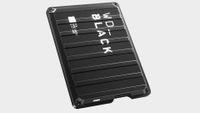

The card over doubles the available storage on Xbox Series S and adds over 50% more to Xbox Series X when factoring in the reserved internal storage on either console. The 512GB model halves overall storage capacity compared to the 1TB Seagate Storage Expansion Card while shaving $80 off the cost. Microsoft and Seagate have also launched a 512GB Storage Expansion Card, delivering the same zero-comprise storage, albeit with a more affordable $140 RRP. While no USB alternative offers the same seamless expansion, that premium price tag can be hard to justify, especially when opting for the largest 1TB and 2TB models.

Xbox Storage Expansion Cards remain the best SSD option for Xbox Series X and Series S, packing the same high-performance storage technology found inside the consoles.

If you can afford the premium, there's no better SSD than this.

It comes with no limitations, mirroring the base console in every way. While Xbox Series X and Series S support countless USB devices, only the Seagate Storage Expansion Card provides a true internal storage extension. It's the nature of cutting-edge technology, drawing the best performance from either console with no compromises. The price isn't surprising, in line with notoriously costly PCIe 4.0 hardware over on PC. with a similar $280 RRP in Canada and £220 in the U.K. The primary hurdle for most will be the price of the Seagate Storage Expansion Card. The device ships alongside a plastic sleeve, protecting the card when not in use. Microsoft also allows those with multiple expansion cards to hot-swap storage on the fly without restarting the console. It's a simple plug-and-play solution, automatically configured to work with Xbox Series X and Series S straight out the box. The Seagate Storage Expansion Card takes a compact form, measuring 53mm by 32mm, only marginally larger than the average thumb drive.
Cheap external ssd for xbox one plus#
New 512GB and 2TB additions released in 2021, providing a cheaper entry point, plus a more expensive high-capacity alternative. Seagate only distributed a 1TB version of the Storage Expansion Card at launch, doubling the base Xbox Series X storage and tripling the initial offering of Xbox Series S. Here's a handy breakdown reflecting the differences between an expansion card and USB storage. While they can store games designed for Xbox Series X and Series S, you'll need to transfer games onto the internal SSD or expansion card to play. Hard drives and SSDs connected via USB can only play older Xbox One, Xbox 360, and original Xbox titles via backward compatibility. However, USB storage still works, but games designed for the consoles can only play from the internal SDD or officially licensed SSD expansion cards. These cards hook up through a dedicated "Storage Expansion" port, located at the rear of new Xbox consoles. The cartridge matches the internal SSD speeds exactly, which means 2.4GB/s transfer rates, with an ultra-fast line to the processor via PCIe 4.0 technology. But USB storage has significant limitations on SSDs, and for Xbox Series X and Series S, they're simply not adequate.Įxpanding Xbox Series X and Series S storage is simple, with Microsoft creating the "Xbox Storage Expansion Card," an official Microsoft-sanctioned SSD designed to meet the demands of current-generation gaming. The consoles rock best-in-class SSD drives, removing a severe bottleneck that punished earlier Xbox One consoles and speeding up load times across the board. The Xbox Series X and Series S bring various enhancements over previous Xbox consoles, but speedy storage has proven one of the most impactful changes to these systems.


 0 kommentar(er)
0 kommentar(er)
